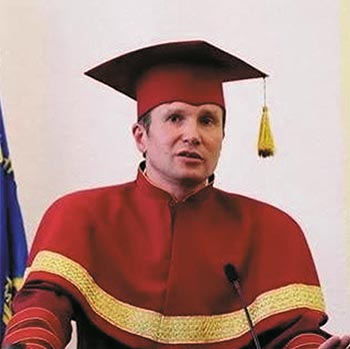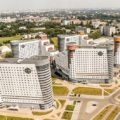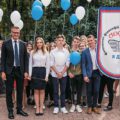On October 30, 1921, the first classes were delivered under the roof of the Belarusian State University. It is this date that marks the beginning of the history of the oldest university in the Republic. The centenary of BSU is included in the list of UNESCO commemorative dates, which makes it an event of international dimension. Numerous rankings confirm the university’s remarkable contribution to the development of world education and science.
BSU formed the basis for the Belarusian system of higher education and science, and many universities, as well as the National Library, originated from it.
The first Rector of the University was an outstanding Slavist, a graduate of the Faculty of History and Philology of Moscow State University (MSU), Professor Vladimir Picheta. Over his 8 years in the role of the head of BSU, he had made a great contribution not only to the development of the University but also to Republic’s higher education and science as a whole. The University staff was mainly composed of experts from Moscow, Kazan, and Kyiv universities. Faculties of Agriculture, Physics and Mathematics, Labor, Medicine, and Social Sciences were the first to offer regular classes. Only in September 1923, the entrance exams were introduced.
For a long time, BSU occupied a number of facilities all over the city. Later, the country’s leadership decided to allocate several buildings in the heart of Minsk to the University. In 1926, a tender for the construction of a new building was announced, a year later the project was approved, and in September 1930, the construction of the campus was completed. These were the years when a final faculty structure was developed.
The 20th anniversary year became the most severe challenge for BSU. On June 21, 1941, an opening of the jubilee scientific session took place, and a festive exhibition was launched. The next day, the Great Patriotic War began. Over the first days, 450 BSU professors and students volunteered to go off to war.
During World War II, BSU was partially relocated to Moscow. It resumed classes in October 1943 in Skhodnya, a town near Moscow. In August 1944, it returned to Minsk. During the occupation, its property was either destroyed or looted, and all the buildings except for the Faculty of Physics and Mathematics were ruined. MSU provided great assistance in reviving the BSU academic activities. The pre-war educational, scientific, and industrial facilities were recovered only by 1950.
In the 60s, Anton Sevchenko, a physicist, assumed the position of Rector. Under his direction, there appeared a large scientific school in the field of spectroscopy, luminescence, and laser physics, the foundations were laid for the study of the theory of elementary particles, optical and acoustic properties of crystals, and a department of computational mathematics was established. BSU became one of the largest scientific and educational centers in the USSR.
The BSU’s liberal education system changed significantly in the 1980s. In particular, the Department of Sociology was founded in 1989, and later that year the Faculty of Philosophy and Economics was created on its basis.
To keep up with the times, BSU founded the School of Business and Management Technologies, the State Institute of Management and Social Technologies, and the Faculty of Journalism. Currently BSU is ranked among the top 1 % of global universities.
Of the 20 existing ones, the University is represented in 12 global and 7 subject rankings. The modern BSU is a powerful educational, scientific, and industrial center. The collection of the university’s fundamental library comprises about 2 million volumes of national and foreign literature.
The university employs over 8000 people. More than 3500 teachers, including 8 academicians, 11 corresponding members of the NAS of Belarus, over 210 doctors of sciences and professors, and more than 980 candidates of sciences are engaged in the educational processes.
Currently, about 30,000 undergraduate, graduate, postgraduate, and doctoral students study at the university. Over nearly a century, BSU has trained about 185,000 specialists. Among the graduates are famous scientists, academicians, professors, laureates of state prizes, people’s poets, honored figures of the Republic, and Olympic medalists.

In September 2017, Professor Andrei Korol, Doctor of Pedagogical Sciences, was appointed Rector of BSU. Talking about the role of modern education, he notes, “What we should impart on our students is not knowledge, but an ability to identify what they do not know. Instead of teaching them to read books, we should be teaching them to read between the lines. Rather than teaching them to give right answers, we should be teaching them to ask questions.” To do so, BSU has been applying technologies and creative teaching methods for the past 3 years.
Andrei Korol emphasizes, “Today education is based on transmitting accurate information. Students are forced to see the world through someone else’s eyes. The dialogue-based heuristic learning strategy is not about getting the theory that is already out there; it allows students to create their own educational products.
International activities are an integral part of the BSU development strategy. BSU is the country’s leading educational institution for foreigners. It ranks first in the number of international students, with more than 4,000 people from 62 countries. Under over 500 agreements, BSU successfully cooperates with 59 states. It now has 12 joint educational programs with partner universities, such as MSU, Mittweida University, Dalian Polytechnic University, and many others. BSU actively cooperates with UNESCO through the activities of its Chairs of Natural Science Education at the Faculty of Chemistry and the Department of Radiation and Environmental Management at the Sakharov International State Environmental Institute.
The students develop scientific and creative projects: the university supports sports and humor contest clubs and has its own Unitechprom scientific and technological park.
BSU has made a significant contribution to space research. The first university nanosatellite in Belarus was created by BSU students and employees. It was successfully launched in 2018.
The university is actively preparing for its anniversary, and all major projects this year are held under the theme of its centenary. Among them are issuing commemorative popular science publications and the unpublished monograph of Vladimir Picheta, renovating academic and administrative buildings, and holding weekly youth events. Symbolically, exactly one hundred bright events are scheduled for this year. Happy anniversary, BSU!
Source: BSU Press Office



